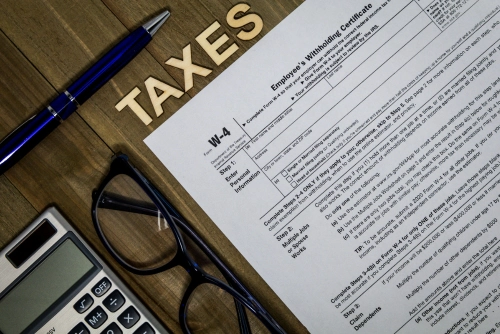
As the year winds down and tax season looms, many individuals and business owners start gathering receipts and preparing for tax filing. One common question that arises is: Are tax preparation fees deductible? Understanding the answer to this question and the potential deductions you can claim is essential in managing your tax burden effectively.
Join the Raleigh CPAs from Steward Ingram & Cooper, PLLC, as we cover everything you need to know about small business tax preparation fees.
Table of Contents
Can You Deduct Tax Preparation Fees?
The Short Answer: It depends.
In the past, tax preparation fees were generally deductible for individuals. However, following the enactment of the Tax Cuts and Jobs Act (TCJA) in 2017, many miscellaneous itemized deductions were eliminated, including the deduction for personal tax preparation fees.

If you’re a W-2 employee and file the standard deduction on your personal tax returns, tax preparation fees are no longer deductible under the current tax law. So, can you deduct tax preparation fees if you’re an employee? No. But don’t worry—there are exceptions to claim tax preparation fees for professional services.
Is Tax Preparation Deductible for Business Owners and Self-Employed Individuals?
For self-employed individuals and business owners, tax preparation fees are considered deductible expenses. As a business expense, tax preparation costs related to your business filings can still be claimed at tax time. Also, if you are self-employed or own a small business, such as a sole proprietorship, partnership, LLC, or S-Corp business structure, you can generally claim these fees as miscellaneous deductions.
This includes being able to deduct costs associated with preparing returns like:
Schedule C for sole proprietors,
Schedule E for rental property owners,
Schedule F for farmers,
Schedule K-1 for partnerships and S-Corps.
Additionally, independent contractors and statutory employees, such as freelance workers or commission-based workers (like food delivery drivers, real estate agents, life insurance agents, etc.), can typically deduct their tax preparation fees.
When Are Tax Preparation Fees Not Deductible?
If you are a W-2 employee or are filing a standard deduction, your personal tax preparation fees are not deductible under current tax law. Also, if your business tax preparation includes personal elements, those costs will not be deductible. For instance, if you’re filing jointly and include personal deductions, the portion of your tax preparation fees that relates to personal matters must be excluded.
How Much Can You Deduct for Tax Preparation Fees?
If you qualify, the amount you can deduct depends on the services you use. If you are a self-employed individual or business owner, here’s a breakdown of common tax preparation-related expenses that may be deductible:

- Tax preparation software used for business-related filings
- E-filing fees associated with submitting your business tax returns
- CPA or accountant fees, including tax advice consultations and tax preparer costs for business returns
- Legal fees related to audit support or specialized tax matters
Keep in mind, only the business-related portion of these fees is deductible. If you’re paying for personal tax preparation (such as your personal W-2 income), those fees are not deductible.
What Factors Affect Tax Preparation Fees?
If you’re wondering how much tax preparation services might cost, several factors come into play:
Complexity of Your Tax Situation
The more complex your financial situation (such as multiple income sources, investments, or self-employment income), the higher your preparation fees are likely to be.
Type of Tax Professional
Different tax professionals charge different rates. A CPA may charge more due to their credentials and ability to handle more complex matters, while enrolled agents or tax preparers may have more affordable rates.
Geographical Location
Tax rates vary by region, with urban areas often having higher fees due to higher costs of living and more complex local tax laws.
The Type of Forms and Schedules Required
The more forms (e.g., Schedule C, Schedule E, or multiple investment forms) required for your tax filing, the higher your fees may be.
Additional Services
If you require extra services such as tax planning, audit defense, or financial consulting, these can result in higher costs.
Common Fee Structures for Tax Preparation Services
Tax preparation costs can vary widely depending on the professional service and the complexity of your tax return. Here are common fee structures:
Hourly Rates
Some tax professionals charge by the hour. Rates vary based on their experience and your tax situation.
Flat Fees
For simple tax returns, some professionals may offer a flat fee. This is more common for straightforward tax filings without complex deductions or multiple forms.
Per-Form or Per-Schedule Fees
If your tax situation requires more forms, such as additional schedules for business deductions, you may pay additional fees per form.
Percentage of Refund
Some preparers charge a percentage of your refund, though this practice is less common and generally discouraged, as it can incentivize preparers to focus on maximizing your refund rather than accuracy.
Additional Services
If you require extra services such as tax planning, audit defense, or financial consulting, these can result in higher costs.
Benefits of Small Business Owners Working with CPAs
As a small business owner, navigating tax preparation and financial consulting can be overwhelming. While it’s possible to handle your business taxes on your own, working with a CPA brings several advantages that can save you time, reduce stress, and maximize your financial efficiency.
Here’s how a CPA can benefit your small business and why it’s worth considering professional tax prep and consulting services from Steward Ingram & Cooper, PLLC.
Expertise and Accuracy in Tax Filing
A CPA has knowledge and training based on years of experience, which ensures your tax returns are filed correctly. They can help you avoid costly mistakes that could trigger audits or result in penalties.
Deductions and Tax Credits You Might Miss
CPAs are skilled at identifying tax deductions and credits that may be overlooked by someone without extensive tax knowledge. From deductions related to business operating expenses, equipment, and software to credits for research and development or energy-efficient investments, a CPA will help you maximize your eligible savings.
Strategic Tax Planning
A CPA doesn’t just prepare your taxes—they also provide strategic guidance throughout the year. By working with a CPA, you can make smarter financial decisions that minimize your tax liability. This includes advice on retirement planning, business structure, and future investments that align with your long-term goals.
Time Savings
Tax prep and financial planning for a small business can be time-consuming. With the help of a CPA, you can focus more on running your business, knowing that your taxes are in capable hands. A CPA will take care of the details, allowing you to dedicate your energy to growing your business.
Peace of Mind
Having a CPA manage your tax prep means that you won’t be scrambling to meet deadlines or worrying about missing important deductions. With a professional handling your taxes, you can approach tax season with confidence, knowing that everything is being done accurately and on time.
Frequently Asked Questions About Tax Prep Fees
Can you deduct tax preparation fees for a small business?
Yes, tax preparation fees are deductible for small business owners. If you are self-employed or own a business, you can deduct the business-related portion of your tax preparation fees.
Are CPA fees tax deductible?
Yes, CPA fees for business tax preparation services are generally deductible, provided the services pertain to your business activities, such as preparing Schedule C for a sole proprietorship or assisting with business-related forms.
Can you deduct tax preparation fees for a rental property?
Yes, if you own rental properties, you can deduct tax preparation fees related to preparing income and expenses for those properties under Schedule E.
Is tax preparation deductible for freelancers and independent contractors?
Yes, if you are a freelancer or independent contractor, you can deduct the business portion of your tax preparation fees related to preparing your business income and expenses.
Maximize Business Tax Deductions by Contacting Our Raleigh CPAs
At Steward Ingram & Cooper, PLLC, we understand the unique challenges small business owners face when it comes to tax preparation and consulting. Our team of Raleigh CPAs is here to provide the strategic advice you need to optimize your tax filings and maximize your savings. Whether you’re looking for assistance with preparing your business taxes or need ongoing tax planning support, we offer tailored services to meet your needs.
Contact us today at (919) 872-0866 or fill out our contact form below to get started.
